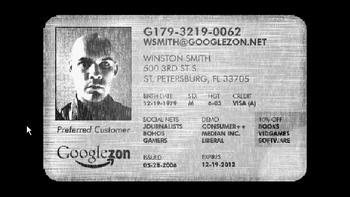I never did get my prophecy degree, but I'll use that childhood interest as an excuse to comment on "Epic 2014," a movie about how the news media industry might look in 9 years or so. It's also worth hearing Brook Gladstone's On the Media interview with Matt Thompson, the movie's creator and narrator.
Thompson breaks a cardinal rule of Prophecy, and makes up specific names and dates rather than the vague signifiers perfected by Nostradamus. Still, it's an intriguing future - Google has merged with Amazon, to form "Googlezon," and Microsoft and Friendster have combined and perfected "NewsBotster," a service that creates an individual news outlet for every single person based on their preferences and those of their social networks. Googlezon one-ups them with "EPIC," an algorithm which mines all the content created everywhere and pieces it into news stories written entirely by robots. The clash of media titans culminates in the Supreme Court case of The New York Times vs. Googlezon, with the Times making a last stand to protect all of our personal data streams.
 Probably very little of the nomination hearings for Samuel Alito will focus on how he would rule in The Times vs. Googlezon, but it's still an interesting future to ponder. It seems like a long road to a feudal information economy ruled by the all-powerful search engine overlord; the world's people transformed into information-gathering serfs. Then again, I seem to be traipsing merrily down that road right now, blogging away while surrendering my rights to private, unobserved thought.
Probably very little of the nomination hearings for Samuel Alito will focus on how he would rule in The Times vs. Googlezon, but it's still an interesting future to ponder. It seems like a long road to a feudal information economy ruled by the all-powerful search engine overlord; the world's people transformed into information-gathering serfs. Then again, I seem to be traipsing merrily down that road right now, blogging away while surrendering my rights to private, unobserved thought.More unimaginable to me is the magical algorithm that can render all those thoughts into a coherent, satisfying, and individualized product. You can have access to all the data in the world (and by 2014 Google very well might have), but it still won't give you the ability to sort, analyze, and present that data in a convincing way. Those tasks, for better or for worse, are what we ask of our news media. If there were a way to just pick out a bunch of elements popular among a certain demographic, reconstitute them, and repackage the result as the hottest new thing, some Hollywood film studio would have figured it out long ago. In reality, the qualities that make a good film, a good book, or good journalism are much more elusive, much more mysterious, and much too complicated for any smart robot algorithm (even Google's) to figure out.
Of course, if I'm wrong about all of this, you can blame my lack of a full prophetic education.


 Technorati Link Count: no. of blog reactions to this post
Technorati Link Count: no. of blog reactions to this post
No comments:
Post a Comment